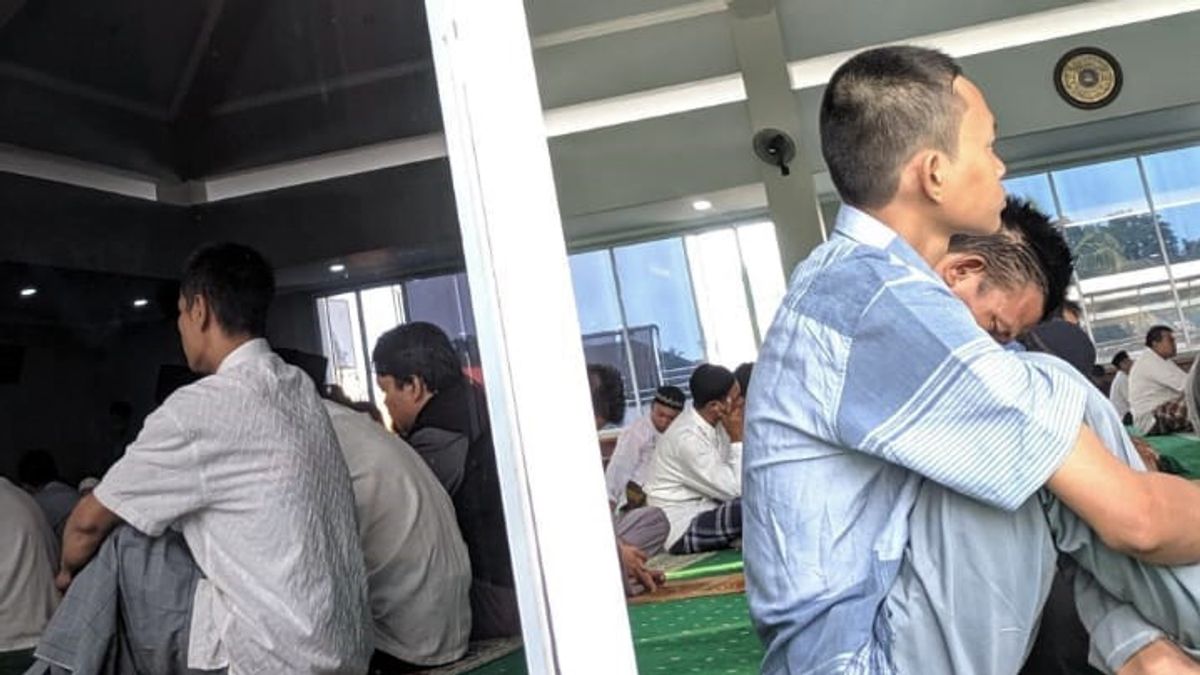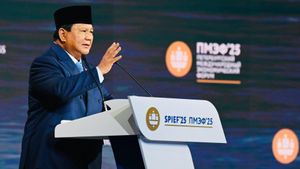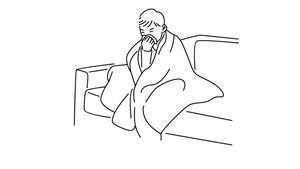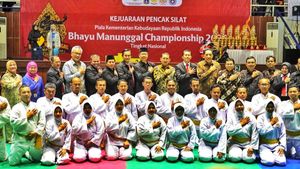JAKARTA - A resident reported tarawih prayers at a mosque in Pulo Gadung, East Jakarta. The report angered a group of mobs. This chaos is a danger signal of confusion that engulfs the community. It doesn't really need to happen if people want to understand that the fatwa issued by the Indonesian Ulema Council (MUI) should not be made arbitrarily. There is a big responsibility that MUI carries in each of its fatwas. Responsibility to religion and state.
Prior to the incident in Pulo Gadung, March 16 to be precise, MUI had issued fatwa Number 14 of 2020. The fatwa signed by the Chair of the MUI Fatwa Commission Hasanuddin AF contained a number of guidelines for the worship of the Muslim community in Indonesia during the COVID-19 pandemic. Guidelines for the implementation of tarawih prayers are contained in the fatwa.
MUI does not allow tarawih prayers in mosques. In its legal provisions, the MUI states that it is haram for someone who is exposed to the corona virus to carry out sunnah worship activities that open up opportunities for transmission, such as congregating five daily prayers, tarawih prayers, to Eid prayers in mosques or other public places of worship.
Meanwhile, for people who are healthy and whose medical status is unknown, they must pay attention to a number of things in their worship activities. Zoning potential for transmission, for example. Healthy Muslims are allowed to leave Friday prayers at mosques and replace them with midday prayers at private residences. This provision applies to other congregational worship, such as the five daily prayers, tarawih and Eid prayers.
An important note in the fatwa, this appeal does not apply in areas that are classified as safe. On the contrary, the appeal is applied as a prohibition in places classified as areas of uncontrolled transmission. In other words, the MUI fatwa is closely related to the decrees determined by the health authorities.
The position of the MUI fatwa
In a simple sense, an MUI fatwa is a decision or opinion established by MUI regarding the life issues of Muslims. When viewed from the perspective of the hierarchy of statutory regulations, in accordance with Law (UU) Number 12 of 2011 concerning the Formation of Legislative Regulations, the position of the MUI fatwa is not legally binding.
Even so, the role of the MUI cannot just be put aside. Quoted from Hukumonline, the legal basis for MUI's position as a partner of the government is mentioned in Presidential Regulation (Perpres) Number 151 of 2014 concerning Funding Assistance for the Activities of the Indonesian Ulema Council.
In the Presidential Decree, MUI was mentioned as a forum for deliberation by Muslim scholars, leaders and intellectuals. They are obliged to protect the ummah and develop an Islamic life and increase the participation of Muslims in national development.

Meanwhile, according to the institution's official website, MUI has a number of important tasks for the benefit of the people, namely:
a. Providing guidance and guidance to Muslims in realizing a religious and social life that is blessed by Allah Subhanahu wa Ta'ala;
b. Providing advice and fatwas on religious and social issues to the Government and society, increasing activities for the realization of Islamic brotherhood and inter-religious harmony in strengthening national unity and integrity as well;
c. Becoming a liaison between the ulama and the umaro (government) and a reciprocal translator between the ummah and the government in order to succeed in national development;
d. Improve relations and cooperation between organizations, Islamic institutions and Muslim scholars in providing guidance and guidance to the community, especially Muslims by holding mutual consultation and information.
Establishment of a fatwa
In essence, MUI stands as the heir to the duties of the Prophets (Warasatul Anbiya). In addition, MUI also has a role as a fatwa (mufti) giver, a guide and servant for the people (narrated by wa khadim al ummah), as an Islah wa al tajdid movement, as well as an enforcer of amar ma'ruf and nahi munkar.
As a decision maker in a fatwa, MUI has a number of main principles and steps that must be followed before establishing a fatwa. All of them are listed in the MUI Organizational Regulations concerning Guidelines for Determining MUI Fatwas.
Broadly speaking, there are eight steps. We will describe in general terms. What is clear, the first step, MUI is obliged to conduct a comprehensive study in order to obtain a complete description of a problem. This first stage is called tashawwur al-trouble.

In addition to conducting studies, MUI is also obliged to formulate problems, including measuring the socio-religious impacts that are caused. Apart from that, the formulation of the problem also concerns the critical points of various legal aspects (sharia) related to the issues being highlighted.
In this case, MUI is also obliged to retrace the views of mujtahid jurisprudence experts, the opinions and sects of priests and scholars, to review other related fatwas. If the law and arguments are clear, the MUI Fatwa Commission will then issue a fatwa by parsing the legal basis as it is. This is important as MUI's responsibility, both to the state and to religion.
The Pulo Gadung Problem
The last sentence is noteworthy. That MUI holds great responsibility for every fatwa they stipulate. This understanding is important for Indonesian Muslims to hold in a situation of the COVID-19 pandemic.
Even so, in the midst of these conditions, the fatwa is not sufficient to cover the hole in public confusion. Sociologist at the State Islamic University (UIN) Jakarta, Tantan Hermansyah, said that coordination between institutions was very important.
To guard the MUI fatwa, for example. In this condition, police involvement is urgently needed to guide the community to comply with the MUI fatwa. The word guiding is important because repressive control is another big problem that must be avoided.
Not an easy matter, indeed. Given the position of the fatwa which is not legally binding. However, sociologically, society needs that assertiveness. "Involve security. Otherwise, the fatwa will be soft in front of the public," said Tantan, when contacted by VOI, Monday, April 27.
While all circles ... #RelawanBergerakLawanCovid In one corner of the city of Jakarta went berserk because one of the residents gave a suggestion not to do tarawih at the mosque .. Indeed chanting advice is very sad but understand .... That's all we can do ... pic. twitter.com/RjwMJYLxw0
- DivaCatrii (@DivaCatrii) April 26, 2020
Regarding the fatwa, Tantan sees three factors that influence people's views. First, the affiliation of religious organizations. Second, the science which is the background of the Muslim community, as well as the context in which the Muslim community is located.
"These three aspects influence each other, especially in responding to fatwas from organizations such as MUI. Remember, MUI is also an organization where not everyone always has to agree with its fatwas. The diversity of relationships is what then colors the MUI fatwa very strongly," said Tantan. .
MUI Secretary General Anwar Abbas also revealed this problem. As quoted by Kompas.com, Monday, April 27, Anwar admitted that the big hole in this problem lies in the role of the government. However, according to him, MUI has exercised its authority by issuing fatwas. The incident in Pulo Gadung, in his eyes, was a pure violation of the law that must be handled by the state.
"The government, as a party that is constitutionally in charge of protecting the people, can make regulations that prohibit people from gathering and / or carrying out activities that involve many people, including conducting congregational prayer activities in mosques and prayer rooms," said Anwar.
"And if the regulations have been made and enforced, law enforcers must enforce these rules by taking action against those who violate them," he added.
However, Anwar emphasized that in this condition, clarity of thought is very important. This means that all forms of law enforcement cannot be seen as resistance to religious teachings as long as law enforcement is based on the spirit of protecting the people.
"They can still perform the worship they want to perform at home either individually or in congregation with family members," said Anwar.
So, with various problems, the state needs to take a real role. The community also has an important role. Perhaps, there is nothing wrong with following the advice of the MUI as the authority that oversees Muslim life in Indonesia. We obey the fatwa, let MUI answer the questions about the legal basis for making the fatwa. To their country, religion and themselves.
The English, Chinese, Japanese, Arabic, and French versions are automatically generated by the AI. So there may still be inaccuracies in translating, please always see Indonesian as our main language. (system supported by DigitalSiber.id)









